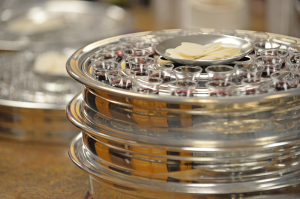“I’M GLAD YOU ASKED!”
(First in a Series)Pastors Answer Frequently-Asked Questions
 Few Lutheran practices seem as controversial as the practice of close communion. In today’s inclusive culture, visitors find it surprising that we limit access to the communion table. Our practice may seem cold, judgmental, even unkind. If this is how it is viewed by others, then why do we practice close communion?
Few Lutheran practices seem as controversial as the practice of close communion. In today’s inclusive culture, visitors find it surprising that we limit access to the communion table. Our practice may seem cold, judgmental, even unkind. If this is how it is viewed by others, then why do we practice close communion?
Our goal is to remain
faithful to Scripture.
Our purpose is not to offend, nor to pass judgment on the faith or integrity of our visitors. Our goal is to remain faithful to Scripture. Perhaps a better question would be, Is the practice of close communion scriptural?
Many passages speak to the issue. One, especially, describes the special closeness in communion: “The cup of blessing which we bless, is it not the communion of the blood of Christ? The bread which we break, is it not the communion of the body of Christ? For we, though many, are one bread and one body; for we all partake of that one bread” (I Corinthians 10:16-17).
Note the “closeness” between the bread and Jesus’ body, between the wine and Jesus’ blood. A few words in particular make this clear. One is the Greek word, “koinonia,” which means: “communion, fellowship, sharing, partnership . . .” Another is “tou,” translated as “the” in English, but perhaps better rendered as, “THE” or “the very.” Is the wine the communion of the very blood of Christ, and the bread the communion of the very body of Christ? The answer is unmistakably Yes! In the Sacrament, as we eat the bread and drink the wine, by God’s decree we receive the very body and blood of Jesus. Though God has not told us HOW this happens, He expressly tells us that it does.
Because it does, there is an amazing closeness between God and the communicant. Imagine not just hearing of the Lord’s love, but actually tasting His forgiveness firsthand. In manmade religions, people make pilgrimages to worship false gods. In communion, the true God comes to us to provide tangible evidence of His mercy and forgiveness. This is one of the reasons the Bible tells us to examine ourselves, lest we misuse the Sacrament and eat and drink judgment upon ourselves (1 Corinthians 11:27ff.).
The closeness of communion is also reflected in the closeness of those who commune. “For we, though many, are one bread and one body; for we all partake of that one bread.” We come from different backgrounds, have different talents and interests, and yet, as we kneel side-by-side at the Lord’s table, we are one. We are children of the same family, and though we may disagree on earthly things, we completely agree on the important things, the things of our faith. When we commune together,
we publicly express our oneness in faith.
Sadly, not everyone believes in the closeness that this passage teaches. Some view the bread and wine as mere symbols of Jesus’ body and blood. Not all realize that this Sacrament brings one into the very presence of God, and therefore, not all are prepared to receive it. Some may be spiritually asleep in impenitence, or simply unable to examine themselves. Any of these circumstances can lead to judgment and harm, instead of forgiveness and blessing. To distribute the Sacrament indiscriminately would be careless and unkind.
How can we look into communicants’ hearts to know if they understand the Sacrament and are prepared to receive it? We can’t. And we don’t. We can only accept
a person’s public profession of faith.
Please see your pastor if you’d like more information or a deeper scriptural study of our church’s practice of close communion.
James Albrecht is pastor of St. John’s Ev. Lutheran Church in Okabena, Minnesota.

